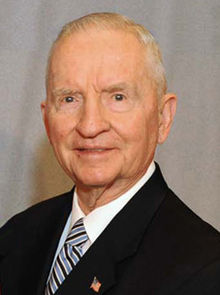Who's afraid of the big bad Ross (Perot)?


Patent arbitrage has been around for some time. It can be one of the more brackish areas of the patent world. This is the first time a big ($200 million) fund has been created for this, backed by big, legitimate investors.
Rosenberg is apparently concerned that a rush by patent holders to cash-in may slow the rush of companies like Computer Associates to hand over patents to the open source community.
Is there reason for concern? Maybe. But maybe not:
- The fund, called Ocean Tomo Capital Fund, is looking to buy-into companies that already have a patent revenue stream.
- Ocean Tomo's Web site says it is mainly amed at creating "mezzanine financing" for companies that want to exploit their patents and need capital to do so, as opposed to law firms.
- Perot's own record at picking winners is no longer what it was. Over the last five years his stock has done no better than that of EDS, the firm he founded in the 1960s.
Ocean Tomo is headed by former venture capitalist James Malackowski and wants to do live auctions of patent assets starting next year.
By putting his name on the fund, Perot gives his company poll position for building the electronic side of that market. Building such markets has been a Perot fascination for nearly a decade now. He has a lot of assets in that area and would, like any investor, like to see a return on them.
The bottom line? No giant sucking sound, no money going into flocks of lawyers, just H. Ross Perot being what H. Ross Perot has been before and since he was in politics, a computer services guy.
Besides, if this fund (which really isn't that bid in the greater scheme of things) get patents from theory to commercial reality faster, how can that really be a bad thing for anybody?